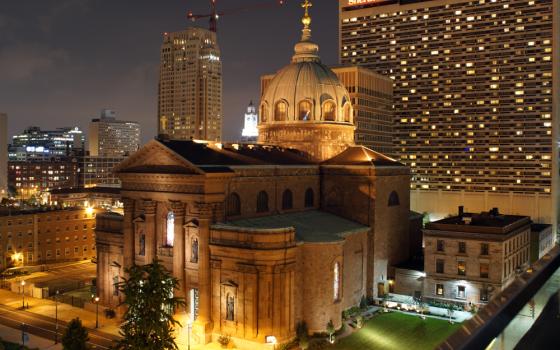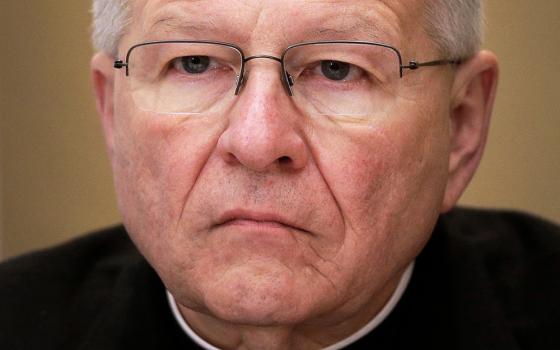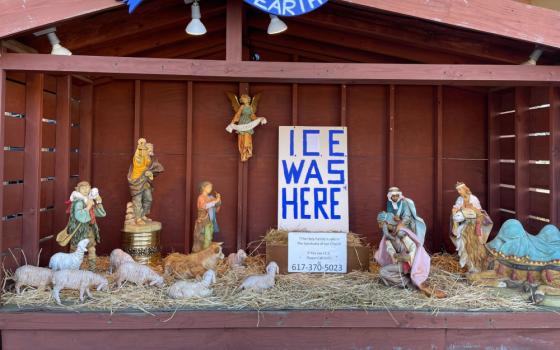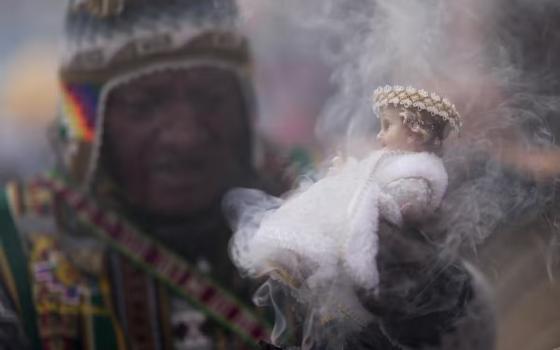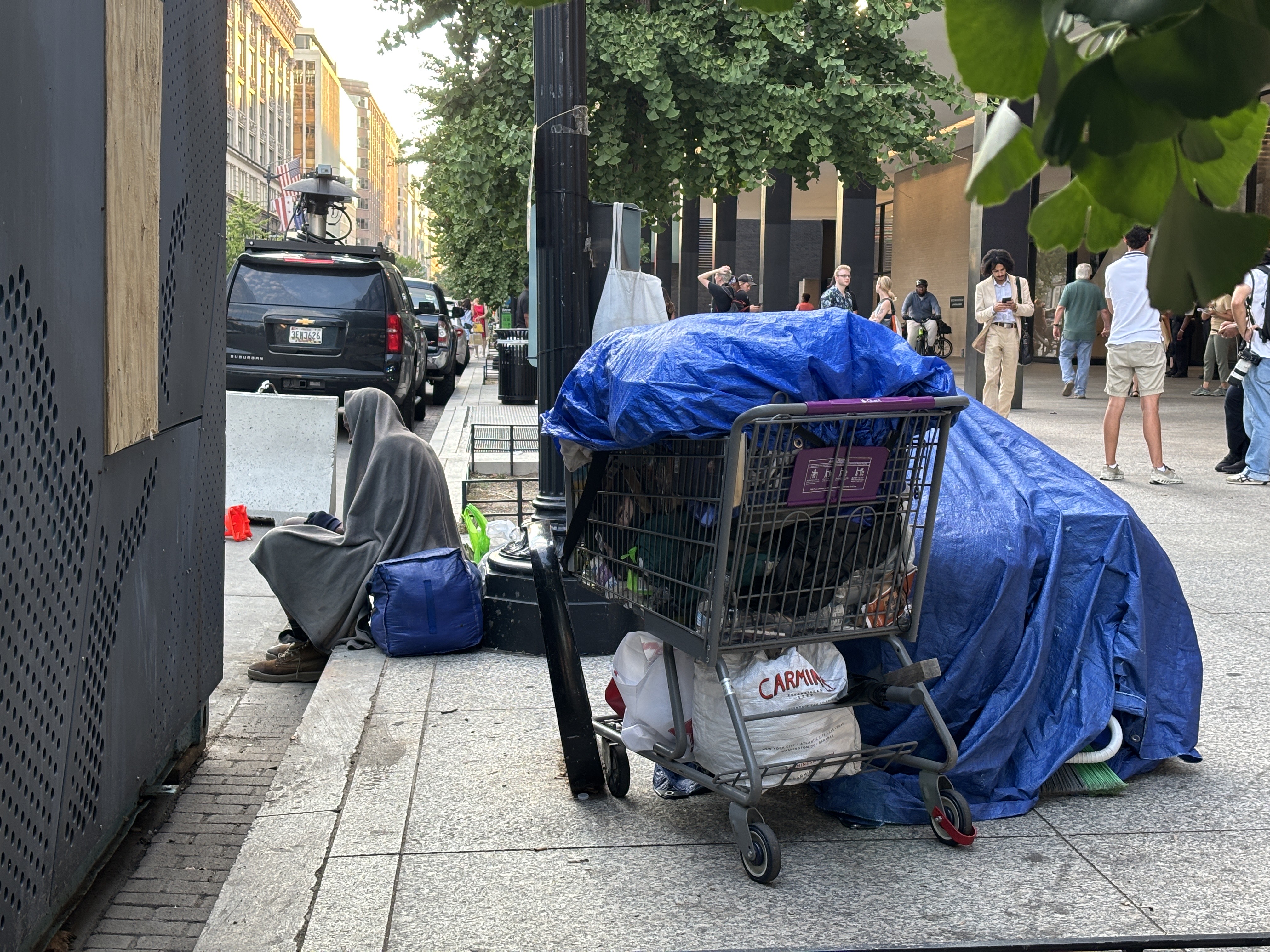
A man sits outside the Martin Luther King Jr. Library in Washington, D.C. on Aug. 14, 2025 (NCR/James V. Grimaldi)
The Martin Luther King Jr. Memorial Library in downtown Washington, D.C., often attracts many homeless people on an average night. They are regularly found nestled against the building’s clear glass windows, sometimes with suitcases in tow, utilizing the library's expansive overhang that extends beyond its entrance, giving them protection from the elements.
Areas like these have become havens to homeless people across the nation’s capital, where homeless encampments are under fresh threat of being broken up.
President Donald Trump and his administration over the last few days have targeted both the city's homeless population and taken big steps to tackle crime in the city. In the case of those without homes, Trump has specifically called on them to leave the District of Columbia.
Albenny Morales, a 46-year-old who said he's been homeless since he was kicked out of his house at 14 years old, has been sleeping outside of the library for months. Sitting propped up against one of the library's square black pillars, Morales has a navy tarp bag labeled "Benny" nestled between his back and the structure.
"It's like now we have to live a life where we have to hide every time we see authorities," Morales said. "It's like a prison."
"Most of what they're doing is totally wrong," he added. "It's unhuman."
People are seen at a homeless encampment in Washington Aug. 11, 2025. President Donald Trump said that day he will place the D.C. Metropolitan Police Department "under direct federal control," activate the National Guard, and "get rid of the slums" in what he called an effort to combat crime in the nation's capital. (OSV News/Ken Cedeno, Reuters)
Trump’s campaign against D.C.’s homeless population kicked into gear over the weekend when he issued a directive condemning crime in the city and called for the D.C. Metro Police Department to be federalized. The administration has since deployed members of both the Federal Bureau of Investigation and the U.S. National Guard.
Trump shared a post on his social media platform, Truth Social, calling on homeless people to leave the city.
"The Homeless have to move out, IMMEDIATELY. We will give you places to stay, but FAR from the Capital,: Trump said in his Truth Social post over the weekend. "There will be no 'MR. NICE GUY.' We want our Capital BACK."
White House Press Secretary Karoline Leavitt said that homeless who don't leave encampments, go to shelters or leave could be fined or jailed.
Unlike Morales, some homeless people, like 30-year-old Lynnwood Wilkins Jr., said they are ready to comply. Speaking outside the library on Wednesday evening, where he also likes to sleep, Wilkins said he is changing his routine.
"I've been trying to start going to the homeless shelters, because they said that they are going to be deploying FBI agents and Homeland Security," he said.
Wearing a blue poncho amid an evening thunderstorm, Wilkins had a suitcase with a blanket attached to it. He said he learned about the administration's actions from someone else in the homeless community.
"He's the president," he said. "You [are] always supposed to listen to what your president says."
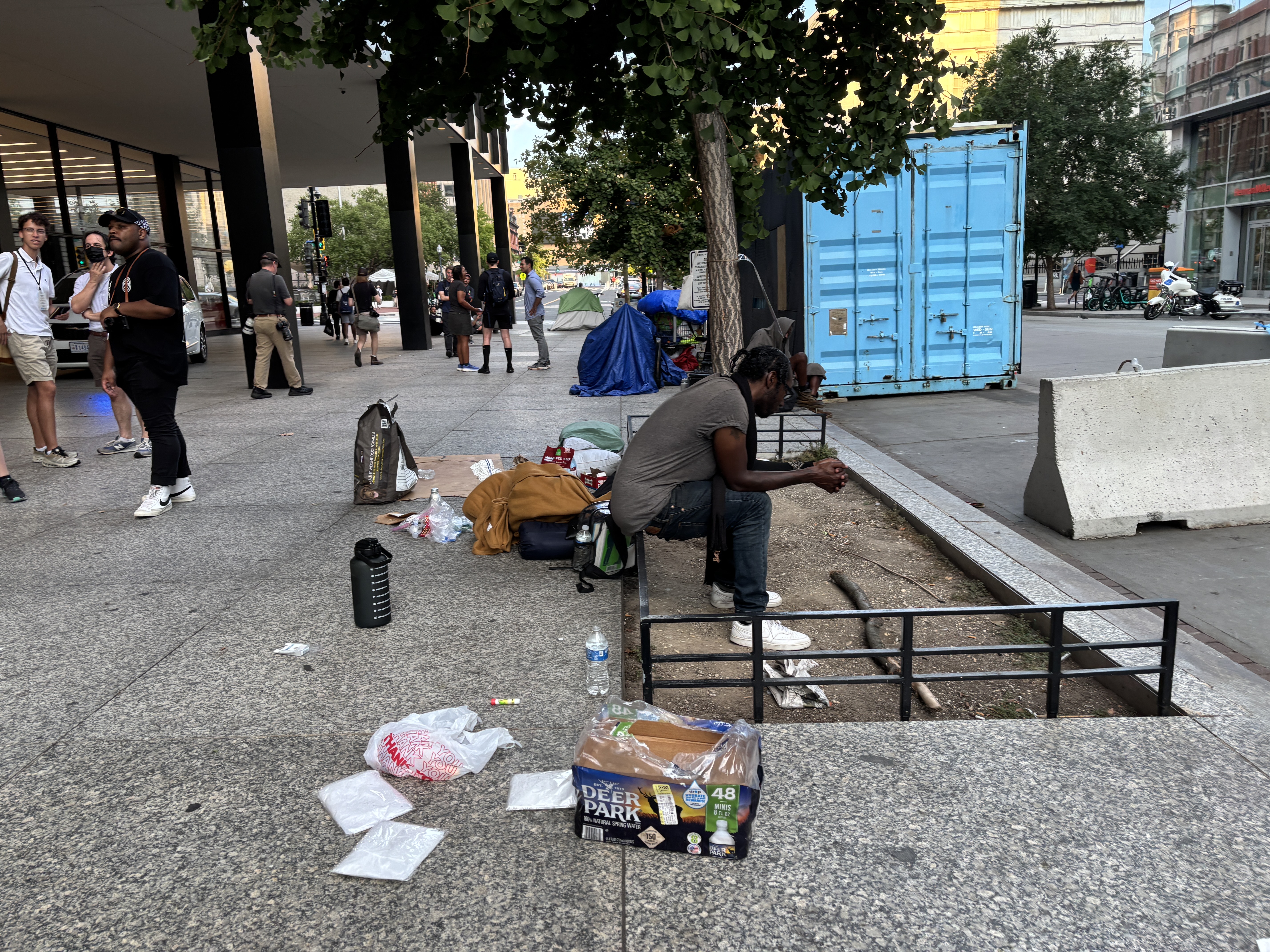
Man sits outside a Washington, D.C. library. (NCR/James V. Grimaldi)
Wilkins said he prefers being outside to taking refuge in a shelter because he likes the fresh air and listening to the rain while being covered by the library’s overhang.
Other people in the shelter might smell bad, he said, while noting they do provide people with laundry and dinner. People from community organizations also regularly bring food by the library and every night a van comes by to take people to a shelter if they elect to go.
"I do have to say, without the homeless shelter and Salvation Army, it would be different," he added. "I might not want to stay out here."
Almost on cue, a United Planning Organization van arrived a short while later and a woman walked around, ready to direct people who are interested in going to a shelter to the vehicle.
Homeless services advocates who spoke to the National Catholic Reporter said they are upset and concerned over the president's comments and the administration's latest actions.
Advertisement
“There’s no concrete plan of erasing homelessness,” said Abigail Hutzel, spokeswoman for the Father McKenna Center, an independent charity founded at St. Aloysius Catholic Church on the campus of the Jesuit Gonzaga College High School.
The Father McKenna Center is one of a number of organizations across D.C. focusing on providing those kinds of services to help the homeless. McKenna, located near Union Station, serves around 250 people a day.
Hutzel called Trump's comments "vague."
To properly address the issue, people must be offered comprehensive services, low-income housing and employment to get at the root of the problem, she said.
"You can’t also push them away from the city because it's very hard to secure services in more rural places," Hutzel said.
McKenna offers bus tokens and Uber vouchers so people don’t have to pay to get to the center or to travel for other services.
“There’s no concrete plan of erasing homelessness.”
—Abigail Hutzel, spokeswoman for the Father McKenna Center
There has been a decline in people in D.C. without a residence over recent years, according to data from the city’s annual census on this topic, known as the Point-in-Time Count. Data collected on Jan. 29 showed that the number of people homeless fell 9% from 2024 and 19% from 2020, according to a news release from D.C. Mayor Muriel Bowser’s office in May.
"The argument that homelessness is worse than it’s ever been … is just factually not true," said Ralph Boyd, president and CEO of SOME (So Others Might Eat), a D.C.-based nonprofit organization founded by Fr. Horace McKenna, the Jesuit priest who also is the namesake of the Father McKenna Center. Since 1970, SOME has helped people with issues like housing, social services, health care and addiction.
Boyd enforces a clear protocol when it comes to federal agents: If you have a warrant for someone, you can come on SOME property. "If you don't," he said, "you're not."
Boyd said a "safe haven is what we're trying to provide for people."


